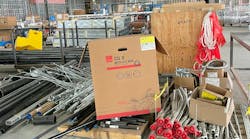I’ve been in this business long enough, you begin to see trends, or (in this case) phrases that continue to pop up throughout the years. Some are positive like “we finish strong,” or “all it takes is one call,” but there are negative phrases that can begin a downward spiral in your business. I like to call these the “forbidden phrases.” As leaders of our businesses, we need to be able to identify these phrases quickly so that we can eliminate them from our workers’ vocabularies. Here are three forbidden phrases at my company:
Phrase No. 1: “Our customers won’t spend their money.” This forbidden phrase typically comes up during coaching sessions or when you’re questioning technicians about their low conversion rate or low average ticket value. Technicians and electricians like to use different variations of this phrase. For example, “They won’t open their wallet” or “It’s tough out there.” The most important thing you can do when dealing with this forbidden phrase is NOT enable it. This can sometimes be really tough on managers, especially those who have, in the past, run calls in the field. We tend to empathize with the techs because we’ve been there and know it can be tough dealing with customers. Beware of this thought process. Most technicians would use that as a crutch for the rest of their career. They may never learn to overcome it because they have yet to learn the importance of mental toughness. Being mentally tough is a vital tool that every successful technician has to have in his or her tool bag.
I speak from experience. I grew my business during some of the toughest economic times this country has seen in several generations. Needless to say, I got hit with these phrases on a regular basis. I remember the day I stood in front of my team and told them the phrase “they won’t open their wallets” could never be uttered again inside our office. I told them it was only an excuse, and it was lazy. They were trained better than that. When they got a “no” from a customer, they should learn from that experience. They needed to ask themselves what they could have done better, and then move on. I lost a lot of people through the years that I thought had everything it took to be great service electricians, but they lacked mental toughness and never made it.
Phrase No. 2: “We need more calls.” Every owner/manager of a residential service company has uttered this statement at some point. I admit that this is a tough one. I still catch myself saying this from time to time. Okay, I know what many of you are thinking right now. “Wait a minute. How can you tell us this is a forbidden phrase, yet you still say it?” The key is to be sure you’re making the absolute most out of every single service call you run before you let it cross your lips. Here’s the process that I take to be sure we’re taking full advantage of every call.
Know your numbers — I know I talk a lot about tracking in my articles, but there’s a good reason for that. It’s very important. For example, if I can see that Joe ran seven calls this week at a 90% closing rate but only has a $200 average ticket value, the answer isn’t more calls, it’s getting Joe’s average ticket up by at least $500. Even if you were to get more calls, you would be wasting your advertising dollars because you’re not maximizing the calls you already have.
Outbound call booking — Make full use of your call taking staff. Call centers of all sizes, whether you have one call taker or 10, all have some downtime. We have a rule in our office that if we still have openings on the schedule for the next morning at 2:00 p.m., the call staff won’t be leaving until they have them filled. We can do that by making outbound calls. These calls are to past clients with maintenance agreements, canceled calls, missed opportunities (they are calls the technician didn’t close or had items the client decided not to have done at the time), or calls the call center didn’t book the first time the potential customer called.
Phrase No. 3: “We can’t find technicians.” This is a very real problem, but if you have an action plan already in place, it doesn’t have to be as dramatic as we tend to make it. A few months back, I wrote an article titled “Common Sense Recruiting” (August 2016 issue). This highlighted the basic tips we follow to ensure we stay as staffed as possible.
• Schedule time every day to recruit. A good rule of thumb is 30% of your time as a manager should be spent recruiting.
• Answer your phone. Always include your personal or business cell (whichever one you have with you 24/7). Make sure answering that phone is a priority. The best recruits will only call once and are less likely to answer a returned phone call because they will have already found a job.
• Ask for referrals. Ask every applicant if they know of anyone who would be a fit for your company. Whether you hire that applicant or not, the person they refer could be the exact fit for your company.
• Keep a database. Maintain updated files on every applicant, referral, or potential applicant with detailed notes. Every time you have a job opening, this should be the first place you go to look to try and fill it.
Hagan is a second-generation electrician. He owns and operates the Mister Sparky locations serving Northwest Arkansas, Oklahoma City, and Tulsa, Okla. He oversees a staff of 30, which includes electricians and technicians. He can be reached at [email protected].




